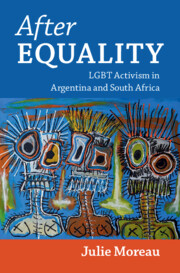Refine search
Actions for selected content:
231 results
Afterlives of Nautch
-
- Book:
- The Archives and Afterlives of Nautch Dancers in India
- Published online:
- 24 October 2025
- Print publication:
- 13 November 2025, pp 170-180
-
- Chapter
- Export citation

Waging Peace
- A History of the Vietnam Antiwar Movement
-
- Published online:
- 03 November 2025
- Print publication:
- 13 November 2025
4 - Labor, Gender, and Civil Society Mobilization
- from Part II - Politics from Below
-
- Book:
- Democracy and Inequality in India
- Published online:
- 11 October 2025
- Print publication:
- 30 October 2025, pp 136-198
-
- Chapter
- Export citation
Indigenous archaeology in Latin America. Towards an engaged, activist and intercultural archaeology
-
- Journal:
- Archaeological Dialogues / Volume 31 / Issue 1 / June 2024
- Published online by Cambridge University Press:
- 23 October 2025, pp. 38-42
-
- Article
-
- You have access
- Open access
- HTML
- Export citation
Conclusion
-
- Book:
- Risk and Resistance
- Published online:
- 10 September 2025
- Print publication:
- 09 October 2025, pp 145-151
-
- Chapter
- Export citation
5 - Gold Mining, Illegality, and Deforestation in the Amazon
- from Part III - Narco-Gold Mining in the Amazon
-
- Book:
- Clearcut
- Published online:
- 03 October 2025
- Print publication:
- 02 October 2025, pp 101-116
-
- Chapter
-
- You have access
- Open access
- HTML
- Export citation
11 - The International System, Global Crises, and Deforestation
- from Part V - Global Deforestation
-
- Book:
- Clearcut
- Published online:
- 03 October 2025
- Print publication:
- 02 October 2025, pp 241-255
-
- Chapter
-
- You have access
- Open access
- HTML
- Export citation
Different aspirations: medicine, activism and uterine vacuum aspiration technology in Spain (1960s–1980s)
-
- Journal:
- Medical History , First View
- Published online by Cambridge University Press:
- 01 October 2025, pp. 1-21
-
- Article
-
- You have access
- Open access
- HTML
- Export citation
Documenting the profession: Recording historic access and retention issues for women in UK archaeology
-
- Journal:
- Archaeological Dialogues / Volume 31 / Issue 1 / June 2024
- Published online by Cambridge University Press:
- 26 September 2025, pp. 76-100
-
- Article
-
- You have access
- Open access
- HTML
- Export citation
Indigenous archaeology in Latin America. Towards an engaged, activist and intercultural archaeology
-
- Journal:
- Archaeological Dialogues / Volume 31 / Issue 1 / June 2024
- Published online by Cambridge University Press:
- 26 September 2025, pp. 1-19
-
- Article
-
- You have access
- Open access
- HTML
- Export citation
Chapter 5 - Erin Fettered; Erin Free?
- from Part II - The Politics of the Irish Revival
-
-
- Book:
- The Revival in Irish Literature and Culture
- Published online:
- 04 September 2025
- Print publication:
- 18 September 2025, pp 109-126
-
- Chapter
- Export citation
The Spiral of Ressentiment: Emotions and Stigma in Populist Radical-Right Party Activism
-
- Journal:
- Government and Opposition , First View
- Published online by Cambridge University Press:
- 19 August 2025, pp. 1-21
-
- Article
-
- You have access
- Open access
- HTML
- Export citation
Introduction
-
- Book:
- After Equality
- Published online:
- 19 June 2025
- Print publication:
- 03 July 2025, pp 1-21
-
- Chapter
- Export citation
Political Activists are Not Driven by Instrumental Motives: Evidence from Two Natural Field Experiments
-
- Journal:
- British Journal of Political Science / Volume 55 / 2025
- Published online by Cambridge University Press:
- 23 June 2025, e88
-
- Article
-
- You have access
- Open access
- HTML
- Export citation

After Equality
- LGBT Activism in Argentina and South Africa
-
- Published online:
- 19 June 2025
- Print publication:
- 03 July 2025
Commencement Speech Morality
-
- Journal:
- Social Philosophy and Policy / Volume 42 / Issue 1 / Summer 2025
- Published online by Cambridge University Press:
- 10 July 2025, pp. 144-162
- Print publication:
- Summer 2025
-
- Article
-
- You have access
- Open access
- HTML
- Export citation
Court Watching’s Promise: A Preliminary Survey
-
- Journal:
- Law & Social Inquiry / Volume 50 / Issue 3 / August 2025
- Published online by Cambridge University Press:
- 23 May 2025, pp. 823-864
- Print publication:
- August 2025
-
- Article
- Export citation
Social activism against the desecularization of non-religious state education in Israel: a social movement lens
-
- Journal:
- Politics and Religion / Volume 18 / Issue 2 / June 2025
- Published online by Cambridge University Press:
- 22 May 2025, pp. 211-237
-
- Article
-
- You have access
- Open access
- HTML
- Export citation
2 - Social Medicine in the Arab World
-
-
- Book:
- Medicine on a Larger Scale
- Published online:
- 05 May 2025
- Print publication:
- 22 May 2025, pp 40-59
-
- Chapter
-
- You have access
- Open access
- HTML
- Export citation
Transnational and Japanese Activism on Behalf of Indonesian and Dutch Victims of Enforced Military Prostitution During World War II
-
- Journal:
- Asia-Pacific Journal / Volume 14 / Issue 16 / August 2016
- Published online by Cambridge University Press:
- 14 March 2025, e9
-
- Article
-
- You have access
- Open access
- Export citation
